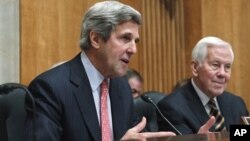CAPITOL HILL -- President Barack Obama's nominees for the next U.S. ambassadors to Pakistan and Afghanistan testified Tuesday before the Senate Committee on Foreign Relations.
After holding diplomatic posts in the United Arab Emirates and Afghanistan, Richard Olson hopes to become U.S. ambassador to Pakistan. At his Senate confirmation hearing, Olson said that recent tensions between Washington and Islamabad do not change the fact that a stable and democratic Pakistan is in America’s interest.
"Continued engagement with Pakistan is necessary to pursue the strategic defeat of al-Qaida," he said. "Engagement is necessary to promote peace and stability in Afghanistan, to encourage regional stability, and to support political and economic stability within Pakistan itself. Instability in Pakistan would undermine what we are trying to achieve in the region."
James Cunningham, who President Obama nominated to be America’s top diplomat in Kabul, where he currently serves as deputy ambassador, said significant challenges remain in Afghanistan, but that U.S. efforts are bringing results.
"Today, the pieces of a long-term, enduring support structure for Afghanistan's continuing progress and development are now in place," he said. "This makes clear to Afghans and the region that the security transition does not mean we are abandoning Afghanistan. And the Taliban appear to be taking notice. For the first time in a decade, they are debating and signaling an openness to negotiations."
Olson and Cunningham testified at a time of growing pessimism and frustration among many lawmakers over a perceived lack of progress in Afghanistan and difficult U.S.-Pakistan relations. The Senate committee’s chairman, Democrat John Kerry (D-Mass.), summed it up by saying, “Obviously, there is no shortage of challenge here.”
Other legislators were more blunt. The committee's top Republican, Senator Richard Lugar (R-Ind.), questioned the basis for continued, large-scale U.S. military commitments in Afghanistan.
"The country is important but does not hold that level of strategic value for us -- especially at a time when our nation is confronting a debt crisis, our armed forces have been strained by repeated combat deployments, and we are attempting to place more emphasis on East Asia," said Lugar.
Another Republican committee member, Senator Bob Corker (R-Tenn.), summed up U.S.-Pakistan ties as "pay-for-play" as he enquired about about U.S. strategy.
"Since it is more of a transactional relationship -- not one that is built on goodwill -- how do we leverage the resources that we have to cause Pakistan to act in ways that we would like to see them act?"
Olson responded by saying that Pakistan must be convinced of an enduring U.S. engagement in the region.
"The great fear among many in the region, I certainly heard this from my Afghan friends when I was serving there, and I think it is true in Pakistan, as well - is that the international community will repeat the experience of 1989 to 1992, when, having accomplished the withdrawal of Soviet forces from Afghanistan, the international community turned away and disengaged."
Committee Chairman Kerry predicted that Olson and Cunningham will be confirmed to their new diplomatic posts. In a rare moment of levity in an otherwise somber hearing, he noted that envoys who succeed at challenging posts usually are rewarded with even more difficult assignments.




